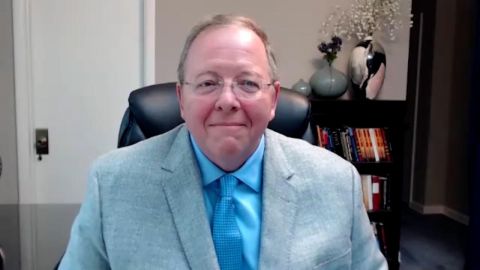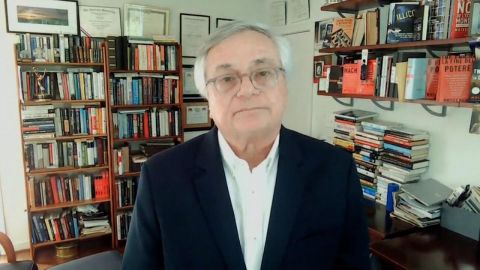Read Transcript EXPAND
AMANPOUR: Yes. We dig now again into a study that’s happened about the January 6th Capitol insurrection of the nearly 400 American rioters who
were arrested or charged, 93 percent are white and 86 percent a male. That’s according to the Chicago Project on security and threats.
Here’s Michel Martin speaking to the study’s principal investigator, Professor Robert Pape, at the University of Chicago with some surprising
revelations about the attackers and their motives.
(BEGIN VIDEOTAPE)
MICHEL MARTIN: Professor Robert Pape, thank you so much for joining us.
ROBERT PAPE, DIRECTOR, CHICAGO PROJECT ON SECURITY AND THREATS: Thank you for having me.
MARTIN: Now, you said from the beginning, it’s important to understand who’s stormed the Capitol on January 6th. And by that, you don’t just mean
for the purpose of bringing criminal charges, you’ve analyzed information about more than 400 people who’ve been arrested so far. And I’m being sort
of vague about the number because the number changes, you know, every day.
You know, some of the people have been in the news, like the guy with the fur har, you know, the guy putting his feet on the speaker’s desk. But you
saw that there are patterns. The first thing — some things that anybody who was actually watching the thing unfold could see, overwhelmingly white,
overwhelmingly male. But we could also see that they’re older
What was the kind of overall sort of profile of the person who got involved?
PAPE: What’s so striking in this case is that two-thirds of the over — now 420, who have been arrested are over the age of 34. We have the
concentration in the early 40s, that is people who are in their 40s and 50s, they have families, they have jobs, they are mature adults. This is a
very different picture than what we’ve seen before.
Further, when we drill to not just what we can see on TV but with this hard research team at University of Chicago Project on Security and Threats,
we’re able to track the occupations. And what we find are 45 percent are CEOs, business owners, doctors, lawyers, accountants, midlevel managers, we
have a State Department official. This is a very different pattern than we’re used to seeing before. Only 7 percent are unemployed. That is the
national average at that point.
These are not people that are two to three times more unemployed. These are not people that are at the desperate end of the job rung ladder. And what
that means is that a lot of our usual solutions just simply won’t apply. So, we usually think with right-wing extremists, well, let’s get them a
job. Well, if somebody is a CEO or business owner that’s going to be a problem.
What about trying to help them to adopt other — significant others in their life? That’s a big disengagement strategy in CVE (ph). Well, if they
already have children, already are married, this is — and they’re already are in a good workplace, this is a very — this is not going to work
either.
MARTIN: And what about the militia attachment piece? That was the other thing. I think a lot of people would have thought that they were part of
these groups that they may have heard or maybe not, don’t know a whole lot about. But, you know, the Proud Boys, the people who are, you know, accused
of, you know, desecrating these two historically black churches in D.C. earlier in the year or the Oath Keepers or sort of Three Percenters.
You found that that’s not the case. It was actually a tiny minority.
PAPE: It is. It’s almost 90 percent of the over 420 arrested for breaking into the Capitol. Now, that we have half of those who broken in. You see,
only 800 broke in. Over — nearly 90 percent are not affiliated with militias or preexisting gangs like the Proud Boys, the Oath Keepers or the
Three Percenters. This is not the usual suspects, these are not the usual ideas of the standard lone wolf, the standard militia group who is doing
the standard far-right violence. This is not the case.
And this is important because if we keep thinking it’s the militia groups, when it’s not, and we keep thinking it’s a lone wolf, when it’s not, then,
of course, we’re going to be surprised again.
MARTIN: So, what did you find? In fact, there’s — you’ve been writing this for the last couple of months but it just doesn’t fail to shock. You
found that there are — there’s a primary driver that stands out across three separate studies, all with different methodologies. And what is that?
It’s one sort of overriding driver.
PAPE: One overriding driver across all of the three studies that we’ve now conducted is the fear of the great replacement. This is the idea. The great
replacement is the idea that the rights of Hispanics and blacks that is the rights of minorities are outpacing the rights of whites. And this is a
consistent factor in several ways in our studies.
Number one. we looked at the origins of where are the individuals who broke into the Capitol, where they lived. And what we discovered is that over
half lived in counties in the United States that Biden won. These are not coming from the reddest parts of America. These are — how many, half of
them from the bluest parts of America.
Now, to be clear these are pro Trumps. The poor. So, I want to be absolutely clear about that. But they’re coming from Chicago. They’re
coming from Houston. They’re coming from San Francisco. They’re coming from Los Angeles and Beverly Hills within Los Angeles. They’re coming from New
York City.
Now, this is — then we started to look more deeply and we discovered that what do the counties — there are about 250 that have produced these 420
plus insurrectionist, what do they have most in common? What’s their biggest risk factor? The biggest risk factor is not whether they’re rural.
The more rural, the less likely a county was to send an insurrectionist. It’s not percent vote for Trump. The higher the vote for Trump, the less
likely the county was to send an insurrectionist.
The number one risk factor was percent decline of the non-Hispanic white population. The more the decline of the non-Hispanic white population, the
more likely the county was to send an insurrectionist. And this would happen by chance, less than one in 1,000 times. So, this is very important
to understand.
Second, we follow this up because, you know, once we knew that, we wanted to say, well, gee. What does — what’s the general risk factor here in the
population at large? So, we conducted a nationally representative sample with the National Opinion and Research Council, this is the gold standard
of opinion surveys, not the kind of cheap thing that people sometimes do on the side. And we asked people, 1,000 American adults, we asked them, do you
believe the election was stolen? And do you — would you willingly participate in a violent protest?
And what we discovered is 4 percent of all American adults, which equates to 10 million people, both believe in the steal and would participate in a
violent protest. We further found that the key risk factor was belief in the great replacement, that is the belief, the fear that the rights of
minorities were outpacing the rights of whites.
MARTIN: Well, is the rights or is it people? Is it rights question or is it just there’s too many people here who don’t look like me and I don’t
like it?
PAPE: In our survey, we specifically focused on the word rights. So, we specifically focused on the rights of Hispanics and blacks rising greater
than the rights of whites. It’s a clear core belief in the great replacement idea. And so, that’s why we’re able to tie the studies together
so that because it’s not just the general findings that overlap, they overlap very tightly.
MARTIN: What made you think about demographic change, the demographic change in the county as something to look at? What made you think about
that?
PAPE: So, I’ve been studying and political violence around the world for 30 years. I started doing this when I started studying political violence
in the Balkans, in Bosnia. Remember the Bosnian Civil War? Well, this was a conflict among Muslims, Croatians and Serbs. I also study Iraq, I also
study Afghanistan, where these are Sunni versus Shia or Pashtuns versus Tajiks.
So, it was natural for me to include as one of the risk factors something about demographics. And in our country, the natural equivalence is the
question I just told you about the rights of minorities versus whites, and that idea just comes basically as rooted in my 30 years of experience.
MARTIN: What you’re saying here has become one of the key talking points of the right-wing media, is that white people are being replaced. But what
does one do about that, because the fact is they do have a right to say whatever they want however inflammatory and racists it may be? This also
comes at a time when there is no political will among people of color to — how can I say this, to attenuate their desire for what they see as equal
rights in order to not scare these people. You know, you’ve got this sort of two competing movements here.
PAPE: So, now that we know more clearly and it’s become more transparent not just to people inside the movement but to now, all of us, as a result
of this, we can focus on understanding the fear. You see, it’s not just an objective reality that’s occurring here, there is fear that is occurring.
And some of that for sure is being manipulated by political leaders, people in the media. I mean, no doubt about that, what you’re saying.
But understanding that is a fear allows us then to understand and break that apart, not to see it as a glob or a blob fear, but we can then pull it
apart. After 9/11, many people thought you could never end the threat of suicide terrorism. That — I was doing a lot of work on the demographics of
suicides terrorists, that led to a lot of policies. And what’s the threat of suicide terrorism today? Zilch or near zilch. And I know because I
studied this in my center as well.
So, this has changed, this — the idea that we can understand more clearly the drivers helps us to understand the vulnerable populations who are
really vulnerable to these fears. And then within that, to understand which parts of that are the convincible part and which parts are not. And this is
how we make progress.
MARTIN: Is it possible that these views are more widespread than it would appear based on the number of people who actually participated in this
specific action as evidenced by the fact that, you know, the former president continues to loom so large over, say, the Republican Party
apparatus in so many places, that adhering to this false notion that the election was stolen has really become kind of a poor belief of the
Republican Party apparatus around the country?
So, is it possible that this belief is more widespread than simply contained and people who took this particular action on a particular day?
PAPE: Yes. So — and that’s one of the advantages of the nationally representative study is because I can tell you numbers. So, we now know
that there are about 4 percent of American adults who fit cleanly into this insurrectionist’s movement as of now. But there are millions of others who
are just right next to this group who believe in the fear of the great replacement, they believe the election was stolen, but they say they’re not
willing to participate in a violent protest.
And I would simply add as the analyst, now. You see what I study political violence around the world, what we see are what we call — and I hope this
terminology is OK, we have passive supporters of a violent movement and we have active supporters of a violent movement. The 4 percent are the really
potentially active support. But there are then others that are more passive. And the thing we have to be concerned about as we go forward is
that some of those who are now — have the same beliefs but are not acting on them in such in the same way could become more active.
This is what’s making Jay Johnson, the former secretary of DHS, so concerned. This is what’s making people who deal with disengagement from
right-wing groups for years. This what they do for their life, they are really concerned when they see the details of what we found because it
really — as Jay Johnson said, it’s frightening.
MARTIN: So, tell me, you promised you had some hopeful direction for us. So, I think this the time to hear it. You say you think that these — the
ideas can be intervened upon or that this behavior can be intervened upon. Tell — so, let’s talk about that now. How?
PAPE: So, think about this like COVID. So, when we first knew there was COVID, people kept saying, well, tell me what to do. Tell me what to do.
Tell me what to do. Well, OK, political leaders told you what to do but they didn’t have any science, much science, behind that. And notice how,
now, that we have science, we can tell people, here’s the science that will help us going forward. Well, that’s what we’re doing now with these stress
testing. We’re doing new research stress testing.
The second thing that’s very important is that we are going to assess, we need to assess the potential of the insider threat in the U.S. military.
So, even though we found only a little over a 10 percent of the insurrectionists were members of militia groups, a third of those were —
had former military service. This is a big deal because even though it’s a relatively small portion out that layer cake of the storm, it’s a
particularly deadly portion, it’s a particular portion that is trained to the highest standards of the use of deadly violence in a world, that’s our
U.S. military.
So, this is something that we need to take very seriously and it’s kind of what we can now do is identify a particularly vulnerable population that we
need to understand the scope and drivers much, much more. Compared to COVID, it’s like understanding pre-conditions driving susceptibility to the
disease.
So, as we go forward, we also need to do more consistent and deeper studies all the way in the run up to the 2022 election season. We shouldn’t look at
these as just one-off studies and now we’re done, because the 2022 election season is going to be on us very, very quickly and we already see,
politically, it’s going to be contentious.
Well, the work I’m focusing on is how much violence should we expect? We know it’ll be politically contentious. I’m not going to be in the politics
of the issue. I want to — we need to focus on the violence part of the issue and we need to be doing that as now routinely, not just wait until
after an event happens and then people say, well, why did that happen? We need to act in advance. And this is one of the great things that we can do,
because we have the tools, we have the — we know how to make advances in our knowledge and we just need to use science.
MARTIN: Professor Robert Pape, thank you so much for talking with us today and I do hope we’ll talk again.
PAPE: Oh, thank you so much for having me. Terrific discussion.
About This Episode EXPAND
Police brutality and excess force is a growing concerning in Central America. International relations experts are worried about possible regional implications.
LEARN MORE



